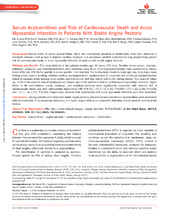| dc.contributor.author | Strand, Elin | en_US |
| dc.contributor.author | Pedersen, Eva Ringdal | en_US |
| dc.contributor.author | Svingen, Gard Frodahl Tveitevåg | en_US |
| dc.contributor.author | Olsen, Thomas | en_US |
| dc.contributor.author | Bjørndal, Bodil | en_US |
| dc.contributor.author | Karlsson, Therese | en_US |
| dc.contributor.author | Dierkes, Jutta | en_US |
| dc.contributor.author | Njølstad, Pål Rasmus | en_US |
| dc.contributor.author | Mellgren, Gunnar | en_US |
| dc.contributor.author | Tell, Grethe S. | en_US |
| dc.contributor.author | Berge, Rolf Kristian | en_US |
| dc.contributor.author | Svardal, Asbjørn M. | en_US |
| dc.contributor.author | Nygård, Ottar | en_US |
| dc.date.accessioned | 2017-08-16T07:55:36Z | |
| dc.date.available | 2017-08-16T07:55:36Z | |
| dc.date.issued | 2017-02 | |
| dc.Published | Strand E, Pedersen ER, Svingen GFTS, Olsen T, Bjørndal B, Karlsson T, Dierkes J, Njølstad PR, Mellgren G, Tell GST, Berge RK, Svardal AM, Nygård O. Serum Acylcarnitines and Risk of Cardiovascular Death and Acute Myocardial Infarction in Patients With Stable Angina Pectoris. Journal of the American Heart Association. 2017;6(2):e003620 | eng |
| dc.identifier.issn | 2047-9980 | |
| dc.identifier.uri | https://hdl.handle.net/1956/16293 | |
| dc.description.abstract | Background: Excess levels of serum acylcarnitines, which are intermediate products in metabolism, have been observed in metabolic diseases such as type 2 diabetes mellitus. However, it is not known whether acylcarnitines may prospectively predict risk of cardiovascular death or acute myocardial infarction in patients with stable angina pectoris. Methods and Results: This study included 4164 patients (median age, 62 years; 72% men). Baseline serum acetyl‐, octanoyl‐, palmitoyl‐, propionyl‐, and (iso)valerylcarnitine were measured using liquid chromatography/tandem mass spectrometry. Hazard ratios (HRs) and 95% CIs for quartile 4 versus quartile 1 are reported. The multivariable model included age, sex, body mass index, fasting status, current smoking, diabetes mellitus, apolipoprotein A1, apolipoprotein B, creatinine, left ventricular ejection fraction, extent of coronary artery disease, study center, and intervention with folic acid or vitamin B6. During median 10.2 years of follow‐up, 10.0% of the patients died of cardiovascular disease and 12.8% suffered a fatal or nonfatal acute myocardial infarction. Higher levels of the even‐chained acetyl‐, octanoyl‐, and palmitoyl‐carnitines were significantly associated with elevated risk of cardiovascular death, also after multivariable adjustments (HR [95% CI]: 1.52 [1.12, 2.06]; P=0.007; 1.73 [1.23, 2.44]; P=0.002; and 1.61 [1.18, 2.21]; P=0.003, respectively), whereas their associations with acute myocardial infarction were less consistent. Conclusions: Among patients with suspected stable angina pectoris, elevated serum even‐chained acylcarnitines were associated with increased risk of cardiovascular death and, to a lesser degree with acute myocardial infarction, independent of traditional risk factors. | en_US |
| dc.language.iso | eng | eng |
| dc.publisher | Wiley | eng |
| dc.relation.uri | http://jaha.ahajournals.org/content/6/2/e003620.long | |
| dc.rights | Attribution CC BY-NC-ND | eng |
| dc.rights.uri | http://creativecommons.org/licenses/by-nc-nd/4.0/ | eng |
| dc.subject | acylcarnitines | eng |
| dc.subject | angina pectoris | eng |
| dc.subject | cardiovascular outcomes | eng |
| dc.subject | metabolism | eng |
| dc.title | Serum Acylcarnitines and Risk of Cardiovascular Death and Acute Myocardial Infarction in Patients With Stable Angina Pectoris | en_US |
| dc.type | Peer reviewed | |
| dc.type | Journal article | |
| dc.date.updated | 2017-07-13T10:48:43Z | |
| dc.description.version | publishedVersion | en_US |
| dc.rights.holder | Copyright 2017 The Author(s) | |
| dc.identifier.doi | https://doi.org/10.1161/jaha.116.003620 | |
| dc.identifier.cristin | 1482179 | |
| dc.source.journal | Journal of the American Heart Association | |

